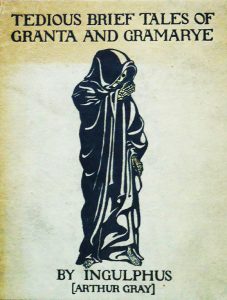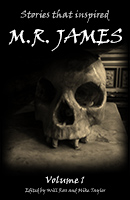 This episode Mike and Will travel back to 16th century Cambridge to get acquainted with a rather unsavory guest at Jesus College in ‘Brother John’s Bequest‘ by Arthur Gray. Booze, burials and bell-book-and-candle are the order of the day here, with a side order of spitting. Eww.
This episode Mike and Will travel back to 16th century Cambridge to get acquainted with a rather unsavory guest at Jesus College in ‘Brother John’s Bequest‘ by Arthur Gray. Booze, burials and bell-book-and-candle are the order of the day here, with a side order of spitting. Eww.
Big thanks to Kirsty for providing the excellent readings for this episode!
Notes
- Arthur Gray (Ghosts & Scholars)
This excellent Ghosts & Scholars article by Rosemary Pardoe provides biographical information on Arthur Gray, as well as plot synopses for all the stories in ‘Tedious Brief Tales of Granta and Gramarye’. It also contains the poem that we mention in this episode, published in 1911, which speculated about the identity of the then-mysterious ‘Ingulphus’! - Ingulf, Benedictine abbot of Crowland (wikipedia)
The 11th century monk Ingulf (or Ingulphus in Latin) is where Arthur Gray borrowed his pseudonym. Ingulf’s writings were studied extensively by historians but his name became a byword for unreliability when the works were found to be a forgery, written long after his death! - Arthur Gray and the Ghost Club (anilbalan.com)
This blog post discusses Gray’s most famous story The Everlasting Club, mentioning how it quickly came to be part of the lore of Jesus College.
Podcast: Play in new window | Download
Subscribe: RSS
Tags: Arthur Gray, Brother John's Bequest, Jesus College, M.R. James, Tedious Brief Tales of Granta and Gramarye, University of Cambridge








What a great story! Did wonder how that old rascal was going to get one over on the college with his will, Didn’t disappoint! His last haunting scene though – must have had a chin like Jimmy Hill. Thanks again lads for being excellent company in these times.
Very enjoyable. I’ll have to look up his stories
Thank you
Thanks for this! I loved Kirsty’s narration; actually I’ve loved everyone who’s narrated. Maybe everyone could do a Zoom table read some day (she said, volunteering many strangers for hours of unpaid labor).
I think gramarye is probably GRAM-mar-ee. That’s my vote.
Enjoy the rest of the weekend, and thanks again!
“Gramarye” is just an old spelling for “Grammar”. Because such a recondite subject (especially in a book) could obviously include occult knowledge. Another word for “Grammar” – via the Old French – was “Grimoire”, which became used for a book of spells. “Grammar” became in Scots “Glamer” – which became our word “Glamour” for a spooky apparition or appearance.
Couldn’t help myself and listened to the episode before I read the story. Went back and I agree, this is a good one, it’s surprisingly funny and the wollop is pretty good! Very Canon Alberic indeed. I was excited to hear you were covering The Everlasting Club, but I’m glad we got this story, it’s made me want to check out his others.
Also very glad to learn about the word ‘gramarye’!
This is a really difficult one to find in Kindle version – at least here in Spain. Any ideas of where to find a copy of either the story or the whole collection to read or listen to?
The collection is now available at Project Gutenberg. 🙂
In the 16th century oysters like other seafood were considered subsistence food. Capons stuffed with oysters was a popular dish in the 17th century.